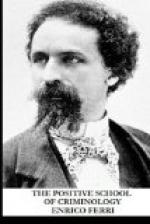The most eloquent fact in this respect was mentioned by Murro, when he pointed out that this change in the frequency of bloody crimes, greater in the warm months than in winter, applied also to prisoners. Statistics show that breach of discipline is most frequent in hot seasons. The social factor does not enter there, because the social life is there the same in winter and in summer. This is, therefore, a practical proof of the influence of climate, and it is re-enforced by the fact that delirium and epilepsy in insane asylums are also more frequent in hot than in cold months. The influence of the telluric factors, then, cannot be denied, and the influence of the social factor intensifies it, as I have already shown by its most drastic and characteristic example, that of want. One can, therefore, understand that a man, whose morality has been shaken by the pressure of increasing want, may be led to commit a crime against property or persons.
It is certainly quite evident, that economic misery has an undeniable influence on criminality. And if you consider, that about 300,000 criminals are sentenced in Italy every year, 180,000 of them for minor crimes, and 120,000 for crimes which belong to the gravest class, you can easily see that the greater part of them due mainly to social conditions, for which it should not be so very difficult to find a remedy. The work of the legislator may be slow, difficult, and inadequate, so far as the telluric and anthropological factors are concerned. But it could surely be rapid, efficacious and prompt, so far as the social factors influencing criminality are concerned.
We have now demonstrated that crime has its natural source in the combined interaction of three classes of causes, the anthropological (organic and psychological) factor, the telluric factor, and the social factor. And by this last factor we must not only mean want, but any other condition of administrative instability in political, moral, and intellectual life. Every social condition which makes the life of man in society insincere and imperfect is a social factor contributing towards criminality. The economic factor is in evidence in our civilization wherever the law of free competition, which is but a form of disguised cannibalism, establishes the rule: Your death is my life. The competition of laborers for a limited number of places is equivalent to saying that those who secure a living do so at the expense of those who do not. And this is a disguised form of cannibalism. While it does not devour the competitor as primitive mankind did, it paralyzes him by calumnies, recommendations, protection, money, which, secure the place for the best bargainer and leave the most honest, talented, and self-respecting to the pangs of starvation.




